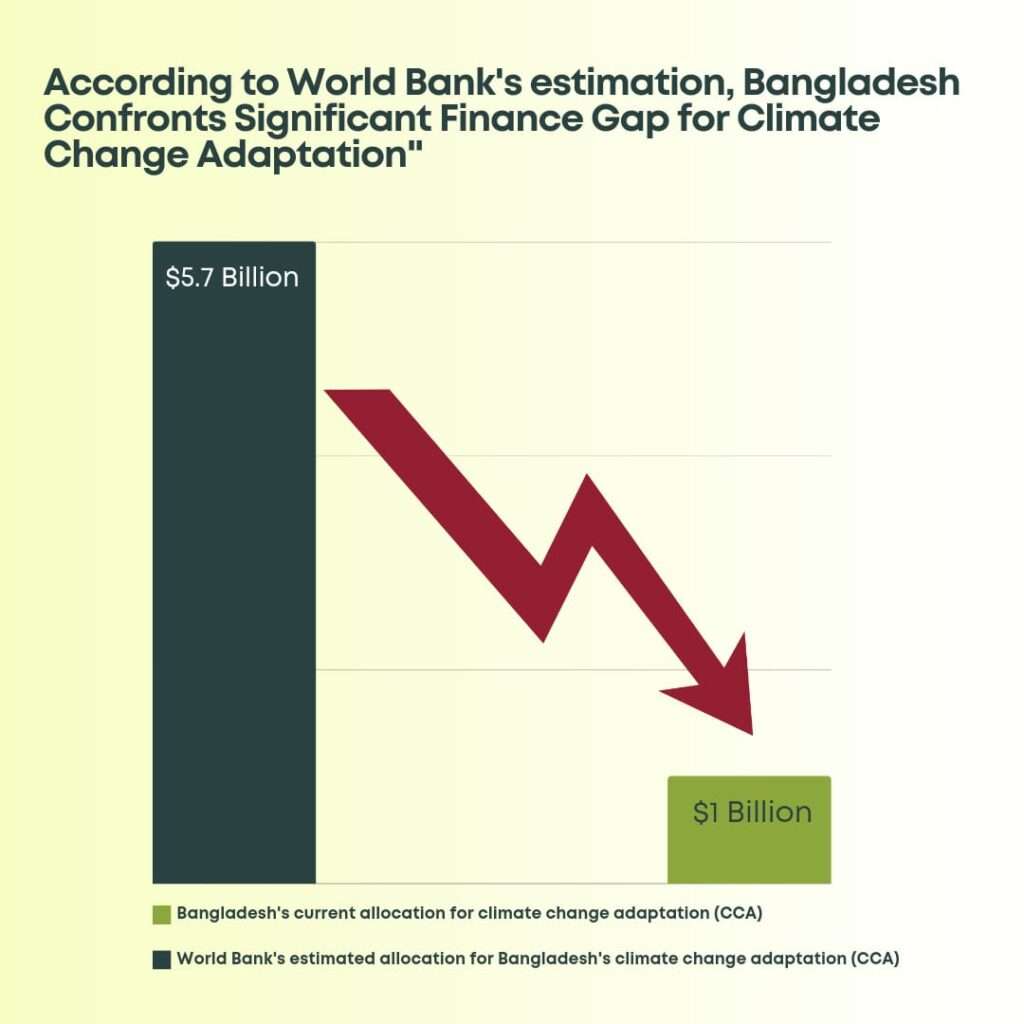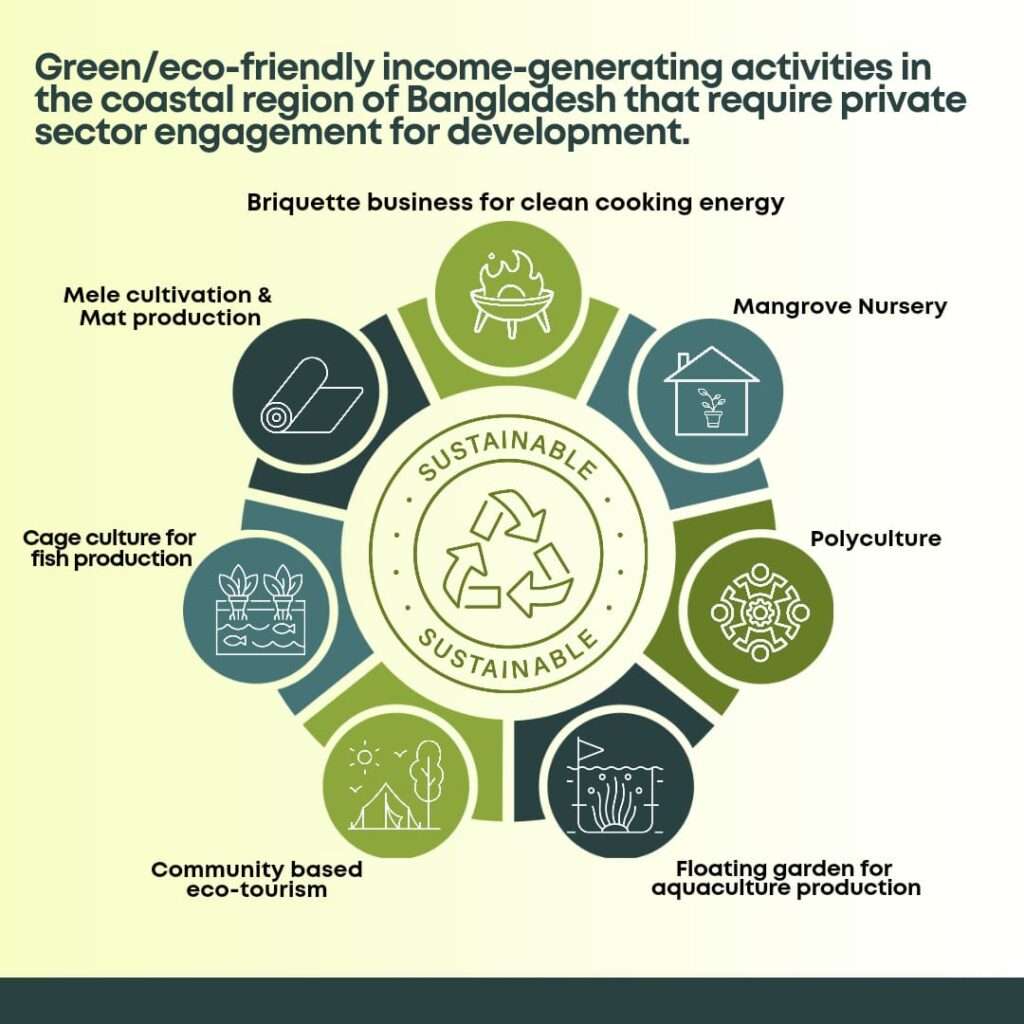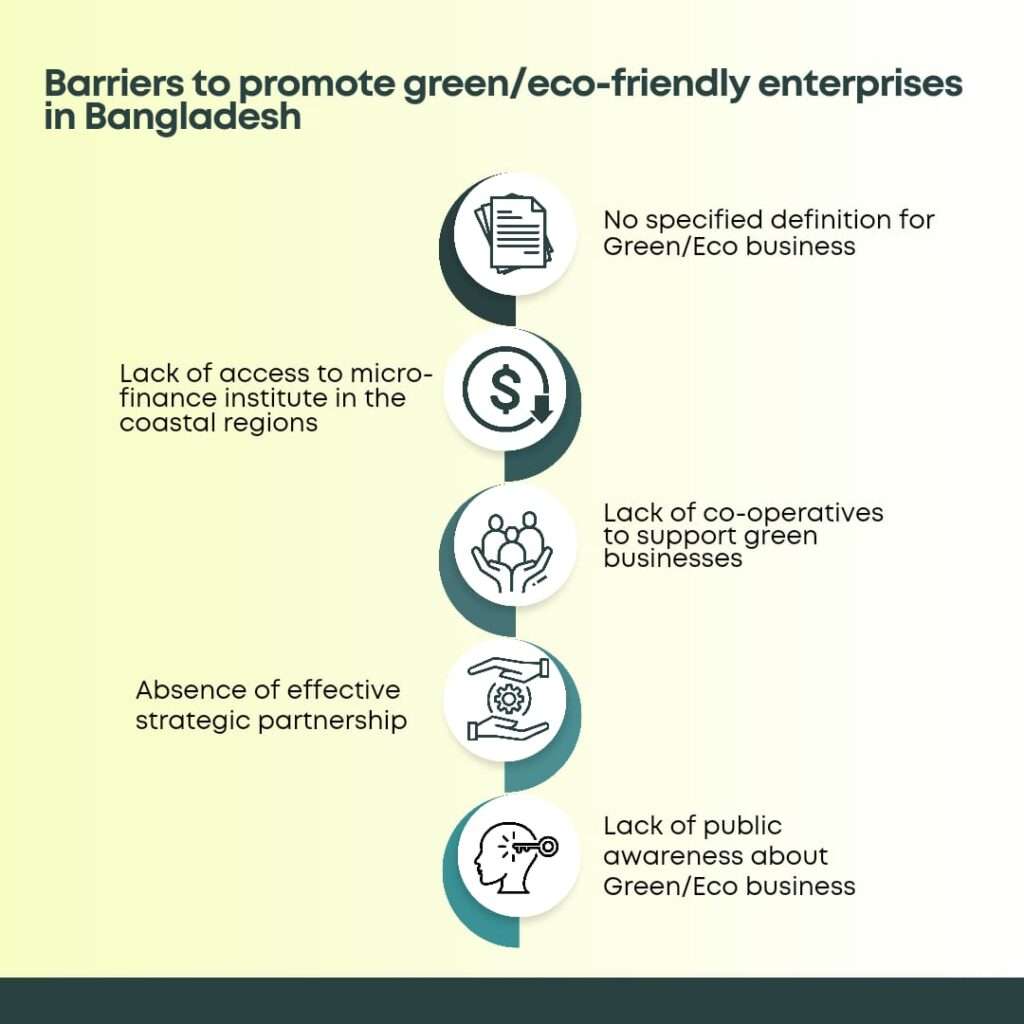Bangladesh faces a substantial finance gap for climate change adaptation (CCA), with the World Bank estimating a requirement of US$5.7 billion by 2050, more than 5 times the current annual allocation of US$1 billion for CCA. Essential adaptation measures are lacking, leaving vulnerable communities exposed to rising sea levels, salinity, floods, droughts, and storms. To bridge this financial shortfall and effectively combat climate change, the private sector’s pivotal role becomes paramount. However, the country’s ranking of 62nd among 76 economies on the Green Future Index 2022, reflecting the urgency for concerted efforts in this direction. Collaboration between the private sector and the government is essential to foster resilience, implement adaptation projects, and steer Bangladesh towards a sustainable, low-carbon future.

And preparing for heightened adverse climate impacts also demands investments in adaptation, with 15 programs in the draft Bangladesh National Adaptation Plan (NAP) estimated to cost US$84 billion. Moreover, developing countries face annual adaptation costs ranging from $70 billion, projected to escalate to $140-300 billion by 2030 and $280-500 billion by 2050. Meeting such significant financing needs for adaptation necessitates harnessing scalable sources of finance from the private sector, in addition to scarce public funds.
The private sector’s engagement is vital in supporting low-carbon growth through investments and technological innovations, providing crucial finance for mitigation and adaptation efforts, adopting eco-friendly production practices, and promoting climate-conscious consumer choices.

Concept of Green/Eco Business
Eco-friendly/green income generating activities (IGA)/businesses/enterprises have become the face of resilient livelihood for the climate-vulnerable people nowadays. They are operated in a sustainable manner, causing no/minimal damage to nature, and using renewable resources where possible. In the coastal areas of the country, several green/eco-friendly income-generating activities/businesses/enterprises are being operated, withstanding the adverse impacts of climate change, and providing an effective livelihood for the coastal people
Barriers to promote green/eco-friendly enterprises in Bangladesh
Although there are some government initiatives in place to promote green/eco-friendly income-generating activities/businesses/enterprises like Green Transformation Fund under Bangladesh Bank and the Green Climate Fund (GCF) for private sector facilities. Some practical barriers still exist hindering the full potential of these businesses. Because of the absence of a government-approved definition of green/eco-friendly business, agencies often discard such businesses and show reluctance to support them. Moreover, micro-finance institutes and insurance companies also do not provide sufficient support to safeguard these businesses. Due to a lack of cooperatives, green entrepreneurs remain unorganized and cannot voice their needs and concerns.

There also lies a gap in strategic partnership among government, private sector, donors, NGOs, and civil society groups in promoting green/eco-friendly businesses/enterprises. Furthermore, there is a knowledge and understanding gap among the coastal communities on green/eco-friendly business/enterprise options, especially the unemployed youth. To reap the benefits of the initiatives taken for years to improve the lives and livelihood of coastal people, it is inevitable to address these aforementioned issues.
How Private Sector's Engagement can change the landscape?
Turning Eco-consciousness into Competitive Advantage
Global companies are leveraging eco-consciousness to gain a competitive edge. A World Economic Forum (WEF) study identifies 16 emerging-market firms that view limitations as opportunities for innovation. For instance, Evrnu transforms textile waste into new materials, diverting millions of tons of waste in the United States. Indian Company, Shree Cement, facing water shortages, devised a highly water-efficient cement-making method using air cooling. Sekem reclaims desert land through organic farming in Europe. The corporate sector in Bangladesh should emulate this approach, driving “green growth” independently as a growth engine. Private sector initiative can lead the way towards a sustainable future, ensuring a competitive advantage and environmental benefits.
Carbon Pricing: Stimulating Green Growth and Emission Reductions
Introducing a carbon price serves as an incentive for promoting green growth, driving emissions reduction, and raising funds to support research and development (R&D) of low- and no-carbon alternatives. To ensure the effectiveness of a carbon price, addressing the inadequately low pricing levels in existing carbon markets and the issue of carbon leakage is essential. Additionally, measures should be taken to safeguard small- and medium-sized enterprises from being excluded from the market, providing the necessary support for a just transition in their business operations.
Tax Incentives and Subsidies: Accelerating Climate Investments
Tax incentives play a vital role in reducing climate investment risks for the private sector, ultimately facilitating the scaling of climate funding. By making green investment more appealing to businesses, tax incentives lead to a general shift towards a greener marketplace. Subsidies, when appropriately employed, can serve as a potent mechanism for fostering green growth; however, careful consideration is necessary to avoid potential hindrances to this objective. Striking the right balance in subsidy utilization is crucial for encouraging sustainable growth and supporting green initiatives.
Fostering collaboration among the Private Sector, consumers & the governing system is vital for advancing green growth initiatives and achieving common objectives, especially in the coastal belts of Bangladesh. This inclusive approach starts from successful policy adoption and guides the private sector towards optimal green growth trajectories to maximizing eco-friendly businesses operating in the coastal regions. Encouraging climate fund investments and private sector engagement in green businesses along the coast enhances the potential for positive environmental impact, sustainable livelihoods, and resilience against climate change impacts in these vulnerable areas.




